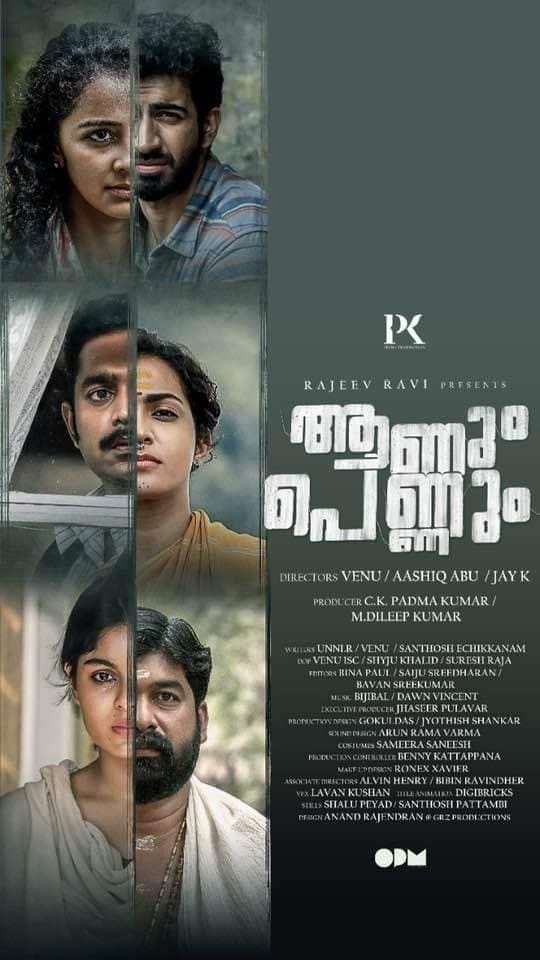Aanum Pennum review: A visually impressive anthology that deserves more attention

Last Updated: 01.21 PM, Jul 04, 2021
What’s it about:
The film is an anthology of three stories set in three different time periods in Kerala. All three stories are told through the eyes of the women of each individual story. The first story is Savithri set in the early 50s or late 40s about a woman on the run from the authorities and her struggle to protect herself from the advances of the male aristocrat whose house she found refuge in as a housekeeper. The second story is set a few decades later titled Rachiyamma, it is the story about a capable and independent milkmaid and her relationship with a plantation officer. The third story, Rani, set in the modern era is about a young couple seeking intimacy in a conservative society.
What’s hot:
All three stories have excellent characters in intriguing settings, brought to life by stunning cinematography and costume design. Each of the stories represents the challenges a woman must overcome and the sacrifices they make, regardless of how the society has changed over the decades in post-colonial Kerala
The first story Savithri, in which Samyuktha Menon plays the protagonist, is a politically charged narrative that perfectly symbolises Kerala’s socio-political juxtaposition - a society that is equal parts conservative and equal parts, socialist. At times these ideologies are at odds even within an individual, as shown through Vineeth Vishwam’s character, Vasu Devan. It also focuses on higher-caste aristocrats who abuse their power to sexually harass and assault women from the lower castes. The narrative also uses mythological allegories as a plot device to further enhance the storytelling. The performances by the cast, which also included Joju George and Indrajith Sukumaran, are thoroughly convincing in the first story of the anthology directed by Jay K.
Rachiyamma is a far more conventional story about love and heartbreak. The story is based on the book written by Uroob. It was also made into a telefilm on Doordarshan Malayalam in 2004 with Sona Nair and Madhupal as the lead actors. The current adaptation has Parvathy Thiruvothu and Asif Ali in the lead, who have provided their own unique versions of the characters - roles that were portrayed to perfection by Sona Nair and Madhupal. Asif Ali in particular deserves immense praise considering he often gets overlooked for his acting prowess, unlike Parvathy Thiruvothu who has been rightly praised for her performances in the past. Directed by Venu, the narrative and the pacing of the screenplay is smooth.
Ashiq Abu’s Rani is the standout among the three in terms of performances by the cast. While the other two stories did have strong performances by the cast, the performances in Rani are simply superb. The third story starring Roshan Mathew and Darshana Rajendra as well as Malayalam cinema legends Nedumudi Venu and Kaviyoor Ponnamma showcases the society's perception of intimacy through the eyes of a young and an old couple. There are some obvious biblical references as well, maybe even hints of John Milton’s epic poem Paradise Lost. The story set in the modern era is probably the most relatable one among the three for the contemporary Malayali society which is still in contradiction with itself about cultural progression despite being progressive in other areas.
What’s not:
While Savithri does an excellent in highlighting caste and class discrimination, it may have gone slightly overboard with the glorification of communism. While the communist revolution did bring about positive changes in Kerala over the years and still continues to do so on several fronts, it is however not without flaws. This is where the narrative should have stayed objective. The script felt like it was advocating communism rather than depicting the plight of communists who were persecuted without a fair trial at the time.
The story of Rachiyamma has not aged well, both characters contradict their own personalities with their actions. Rachiyamma who is portrayed as empowered and independent is ultimately defined for her selfless sacrifice for a man she barely knew intimately, whereas Kuttikrishnan decides to make drastic alterations to his life on a whim against his basic instincts. It does not translate well in the 21st century.
Verdict:
The film has probably been hindered by the lack of promotions prior to its release. It does, however, deserve to be recognised for the excellent cinematography, themes, performances and pacing of each story. The film is one of the many films in Malayalam in recent years where the filmmakers have pushed the boundaries in terms of storytelling.
Subscribe to our newsletter for top content, delivered fast.

